







Welcome to the July issue of Garden Centre Retail. It’s our first standalone July issue for a few years, which is testament to the growth we’ve been through over the past two years. At the time of writing this, it’s about nine weeks until the school summer holidays, which has got me thinking about ways that we will be entertaining our children for the six week break.
Maybe I’m biased, but a garden centre seems to be one of the obvious choices. We can go and grab some breakfast, do a bit of shopping in the store, then work together to plan out our family garden for the upcoming seasons. Is there a better way to motivate children to do some gardening than by empowering them to make choices whilst being treated to a breakfast and drink? We’re very much looking forward to our visits to garden centres, and I’m hoping that this period will be a strong one for our sector.
Moving on to the July issue, we’ve got a fantastic interview with south-Wales based


Jayne James, a director at Pyle Garden Village. Jayne is part of a multi-generational business that is adapting to the modern era in very innovative ways.
We’ve also got a great feature on geospatial data, and the way that geospatial information can form the basis of business growth.
Understanding your customer through the information readily available is imperative for all marketing plans and can help towards making well thought-out investment opportunities. Thanks to Chris Duley at Adept Insight for his input in this article.
Elsewhere, we have a host of regular contributions from the GCA, GIMA, Honest Communications and Andrew Burton, and another very insightful feature on supply chain issues from industry expert Cassie King.
Have a great start to the summer, I’m sure we’ll see you all soon.
Eljays44 Ltd
BizSpace, Courtwick Lane, Littlehampton, West Sussex, BN17 7TL
EDITORIAL
Head of content – Joe Wilkinson joe.wilkinson@eljays44.com Tel: 01903 777 587
Content subeditor – Carmel Mary carmel.mary@eljays44.com
Graphic Designer – David Perry david.perry@inspire44.com
ADVERTISING
Portfolio director – Luke Page luke.page@eljays44.com
Tel: 01903 777 580
Sales director – Adolfo Pedrosa adolfo.pedrosa@eljays44.com
MANAGEMENT
Managing director – Jamie Wilkinson
CIRCULATION
Subscription enquiries info@eljays44.com Tel: 01903 777 570
Printed by Stephens and George Ltd
Published by ©Eljays44 Ltd
Garden Centre Retail is published by Eljays44 Ltd. The 2025 subscription price is £125. Subscription records are maintained at Eljays44 Ltd, BizSpace, Courtwick Lane, Littlehampton, West Sussex, BN17 7TL. Articles and information contained in this publication are the copyright of Eljays44 Ltd and may not be reproduced in any form without the written permission of the publishers. The publishers cannot accept responsibility for loss of, or damage to, non-commissioned photographs or manuscripts.
Whilst every effort has been made to maintain the integrity of our advertisers, we accept no responsibility for any problem, complaints, or subsequent litigation arising from readers’ responses to advertisements in the magazine. We also wish to emphasise that views expressed by editorial contributors are not necessarily those of the publishers. Reproduction of any part of this magazine is strictly forbidden.

The GCA half-year review
GCA Chief Executive Peter Burks explains the challenges and successes member businesses have experienced from the first 6 months of 2025. 08
Perfect for home or away
GIMA members share their expertise on the latest products in the home and gift product category. 10 The power of collaboration
Andrew Burton of Pleydell Smithyman discusses the holistic benefits of collaborative working and the opportunities it can bring. 13
15
Social Proofing
Industry PR experts Honest Communications discusses the currency of consumer trust and explores how you can use social proofing to earn it.


An interview with Jayne James
Jayne James, director of Wales-based Pyle Garden Village talks to Garden Centre Retail about her family business and the modernisation of the company. 21 Rooted in uncertainty
Regular GCR contributor Cassie King speaks with the industry about the challenges the supply chain is facing

Geospatial Data
Chris Duley of Adept Insight talks us through Geospatial data and the benefits understanding the locality of your customers offers a garden retail business
in the



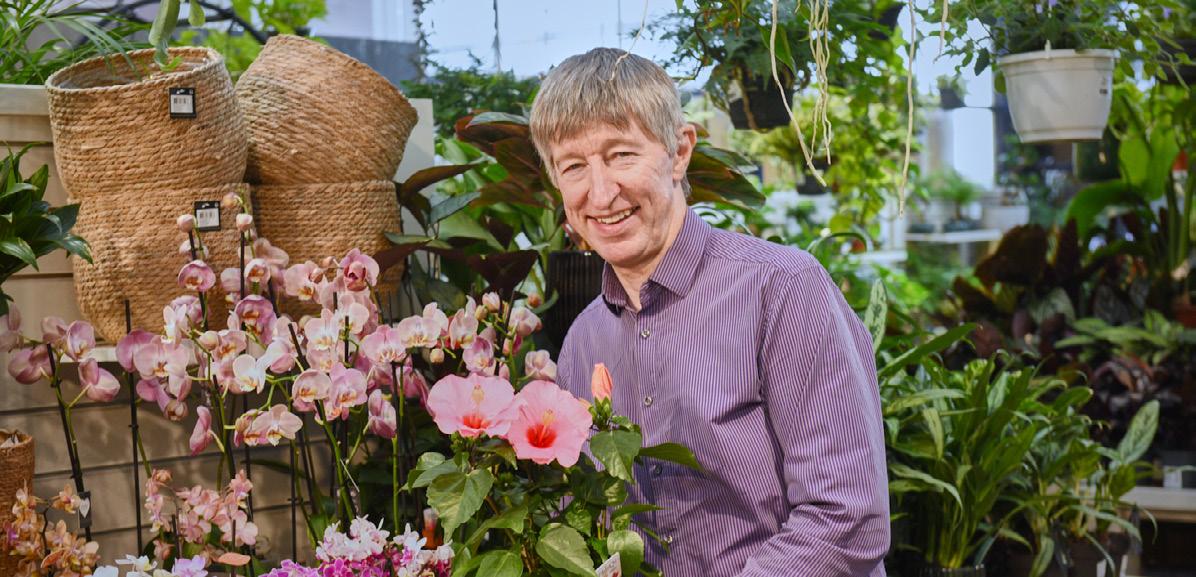
At the beginning of the year, I commented on the issues I was hearing from our Garden Centre Association (GCA) members and the discussions that were underway regarding the problems perceived to lie ahead.
It has been reported that we have come through the sunniest spring on record and have already had more hours of sunshine this year than we did in the whole of 2024.
As we all know, the right weather solves most of our problems and this amazing spring weather certainly helped with that. At the time of writing, the industry has had its most fantastic 14 weeks of peak season and has come through it with very few issues.
Initially, there were some stocking-up issues where centres hadn’t ordered many, if any, pre-season deliveries and suddenly needed them. During this busy period, suppliers in all sectors have coped admirably with only some compost deliveries, this category showing huge growth this spring, being a little delayed.
I know our members are very appreciative of the support they have had from all suppliers over this period.
These good early sales helped improve cash flow throughout the industry, settled any nerves following the poor performance in 2024, and reduced the impact of the largest cost increase we’ve seen this year, specifically national insurance and the minimum wage.
Garden centres approached this in many ways, once again demonstrating that the reactive skills of the industry are outstanding. The collaborative discussions within the GCA have also helped centres refine their approaches. Generally, all centres have looked at their total costs and then found ways to control or reduce them. Some, with help from their teams, have looked at increasing their takings with simple add-on sales techniques to cover these costs. Others have looked at reducing opening hours, for example, and ways to pay in the restaurants and I have also heard about the first self-serve checkout.
As trade now drops to its usual lower summer figure, I think it’s important centres refocus on those decisions and initiatives that were started back in January and February. The manic trade probably meant these were put on the back burner while everyone tried to cope with the increase in demand and the watering, but they now need to start using these initiatives for the benefits to be felt over the rest of the year.
I also commented on the need for good data to initiate or support discussions and what a valuable tool our Barometer of Trade, is for those GCA members who participate in this. I am pleased to say that so far this year, we have had more than 20 new garden centres join the Barometer of Trade, with the number that add their figures to this now totalling 112 individual
centres. It’s so important to be able to see how you are doing in comparison to your peers and to use this as a tool to improve those areas that you might be missing out on.
As I look at the figures that come out of the Barometer of Trade it’s great to see an increase in total sales of 9.45% year to date, hopefully that’s cash banked and saved for a rainy day. But it’s also very encouraging to see that while the gardening categories flourished as expected, all of the categories we report on showed a positive increase compared to last year, showing that customers are shopping all areas of a centre, which can only be good news for the months ahead.
About Peter Burks
Peter Burks, CEO of the Garden Centre Association, is a fully- trained horticulturalist and has worked in directorial and management roles for over 40 years. Peter helped set up and run the multiaward-winning Sanders Garden World in Somerset. He also became regional manager of the South West for Wyevale Garden Centres, general manager for Trelawney’s in Cornwall, and managing Fermoy’s Garden Centre in Devon. gca.org.uk


As home and gift ranges continue to provide year-round sales opportunities, GIMA members offer a rundown of some of the most desirable lines to keep tills ringing, whatever the weather.
Diversification into non-core categories remains key to weather-proofing a garden retail business but it also provides the chance to offer customers something a little different and tempt browsers with a host of irresistible impulse buys.
All wrapped up
Deva Designs has unveiled its new Spring/ Summer collection of designer-led gift wrap, featuring contemporary, vibrant patterns that bring a fresh, high-end look to any gift. This standout range includes double-sided flat wrap, premium roll wrap, and stylish gift bags—perfect for every occasion. Designed with both beauty and sustainability in mind, all packaging is FSC-certified, recyclable, and biodegradable. Each piece reflects Deva Designs’ commitment to quality, creativity, and eco-conscious living. Whether you’re wrapping for a celebration or a special moment, this new collection offers a luxurious finish while caring for the planet. Thoughtfully made, beautifully presented.
Meanwhile, sometimes the simplest thing can bring the most happiness, according to twine specialist Kento & Co. “There’s something really homely about a spool of string,” says operations director, David Cartwright. “What a useful gift, whether for tying packages, crafting, gardening or equally
sitting on a shelf as a decoration. Our gift boxes appeal to everyone with three 150g spools of green twist, natural jute and black jute. Made from natural properties our team work tirelessly to produce high quality twine, string and rope for the home, gardening, building and ironmongery trade.”
Creative gifting
Taylors Bulbs has been hard at work on its Bulb Gift offer for autumn/winter 2025. With 20 new products, Taylors offers one of the most comprehensive ranges of growing gifts in the market. National accounts/ marketing manager, Ian Clark says: “We have been busy updating our gift offer, making it easier for our buyers to choose from, by grouping products into design-led families. This has worked really well and is helping buyers to create more cohesive ranges with our products; we expect this to translate into better and more productive retail displays this autumn.”

most popular plant pot ranges for the home. The elho x Lex Pott collection blends bold, harmonious colours in timeless flowerpot sets that bring modern design into the home, the Winery Gift Set repurposes plastic waste from wine production into rich, warm-toned pots in three sizes, and the Ocean Gift Set transforms recycled fishing nets into unique marbled designs in tranquil Pacific green. Each offers a stylish yet sustainable option that is ideal for gifting.”
When it comes to gifts for gardening enthusiasts, beautiful planters are always a great seller. Elho UK NEU & ROW sales manager, David Nicholson says of elho’s latest giftware offering: “The newest online additions include curated sets featuring some of its
It’s not just about grownups either; there are plenty of great giftable ranges for younger recipients, including Deco-Pak’s Rockin’ Pebbles and Pens. Tapping into the trend for decorating pebbles and ideal for sparking the imaginations of customers of all ages, these pebbles and pens make great pick-up lines. Perfectly placed to increase impulse and gifting opportunities for retailers, the Rockin’ range also drives loyalty amongst both parents that have young children and craft enthusiasts. MD Craig Hall says: “The year-round market for hobbies and gifts is a key growth area for garden centres and retailers. Rockin’ Pebbles appeal to consumers by promoting fellowship through acts of kindness, while combining creativity in a healthy pursuit that can be enjoyed by children and adults alike.”
The Celebration wildflower seed tin from Johnsons Lawn Seed makes an ideal gift for wildlife enthusiasts or those gardeners keen to embrace the rewilding aesthetic. The eye-catching tin is user-friendly and packed with easy-to-sow native wildflower seeds to help consumers achieve beautiful displays that are guaranteed to attract butterflies and bees to their gardens. The mix of 15 various wildflowers doesn’t include additional bulking agents, meaning the handy-sized tin contains enough seed to cover an area of up to 15sq m. Consumer manager, Guy Jenkins says:“We wanted to create something that not only looks good on shelf – or in a till-top display – but that also delivers results for anyone receiving the Celebration tin as a gift. This can keep pollinators in the gardens and inspire customers at the same time.”
Finishing touches
Primeur is helping to bring style and practicality to every doorstep with its doormat ranges – a smart choice for stylish homes and thoughtful gifting. From the hardwearing Mighty Mats® to the charming Bree Merryn collection, each mat offers a clever blend of durability, design, and function. Whether it’s charming prints featuring countryside companions or practical pieces with lasting appeal, these are gifts that don’t just look good – they work hard, too. With options for every season and home style, Primeur’s doormats offer a fresh take on everyday essentials.

“Solar lighting is a must-have product for garden retailers, offering customers the chance to create a welcoming outdoor ambience, without the need for electrical installations,” explains Rachel Morris, marketing manager at 4lite. “The Antheia Solar Range is a collection of wall, path, bollard, spike and festoon lights combining a sleek, modern design with robust, die-cast, weatherproof materials. The Antheia LED Solar Wall Light, available in two designs, is IP54-rated, supplied with warm white LED bulbs and 4lite’s four-year guarantee. As well as being easy to install, they are free to run,
harnessing the suns natural energy to offer an impressive 10-12 hours of illumination.
Alistair McNeill of The Outdoor Edit comments: “We believe that your outdoor space is just as important as your indoor space, which is why we have developed functional outdoor accessories with all the style of interior decorations. Our outdoor cushions come in a range of trend-inspired designs to suit unique consumer styles without compromising on outdoor usability; they are shower-proof, generously sized, and comfortable. And our portable lighting range was designed to light up any space, inside or out. We developed two playful shapes, The Mushroom and The Luma, in an array of stylish colours. Each light is cordless, rechargeable, and dimmable.”

Garden enhancements
Not only do garden ornaments look great when displayed on the shopfloor, they are perfect for generating impulse sales, as shoppers seek to add interest in their own gardens or give a thoughtful and unusual gift. Norfolk based family business, LV Bespoke says its decorative glass garden stakes are one of its top selling lines in 2025. Mounted on six mm steel at a height of 1150mm, the stunning 3D garden stakes are available in a range of designs to suit a variety of tastes. The intricate 3D visual effect of the crystal ball creates a captivating display that will enchant visitors and elevate outdoor décor. RRP £29.99. L V
Bespoke specialises in products with a glass and marble finish, an example of which is the cluster of five prisms, which retails at £75. Help customers spruce up their gardens with the Greenkey Hanging Bird Bath; a striking, hand-painted wild bird accessory crafted in a specialist workshop. The vibrant blue design offers a dual-purpose feature: a refreshing bath for birds or a feeding station for bird food, attracting wildlife all year round. Supplied fully assembled for effortless setup, so that users simply hang up and enjoy the beauty of nature. Made from metal, the Hanging Bird Baths are a charming blend of artistry and
practicality, designed to delight bird lovers and elevate any garden setting.
Meanwhile, Tildenet Gardenware has collaborated with the Royal Horticultural Society to launch the RHS-endorsed Country Forge Range – a beautifully handcrafted collection of garden structures, hanging baskets, and plant supports that combine Tildenet’s dedication to quality craftsmanship with the RHS prestigious reputation – offering gardeners a stylish selection of elegant and functional garden products.
The RHS Country Forge brand is reinforced with strong ‘Hand Crafted’ messaging on packaging and clear POS displays, whilst each item in the range bears the iconic RHS logo reserved for products of the highest standards of quality and authenticity.
Enhance your garden centre’s offering with Altico Pot Toppers—premium decorative aggregates designed to transform plant displays! Just right for topping pots and planters, these high-quality stones elevate aesthetics while helping retain moisture and suppress weeds. With a range of stylish colours and textures, they add the perfect finishing touch to any plant arrangement indoors or outdoors. Altico Pot Toppers are easy to use, making them a must-have for customers who value beauty and practicality. For ultimate in store presence there are space-efficient merchandising stands available, which can be dual sited in garden centres to encourage impulse purchases.
GIMA is a membership organisation of around 170 companies representing the majority share of suppliers and manufacturers operating within the UK gardening industry, together with an estimated £4billion in annual trade.

GIMA’s goal is to promote the commercial, trading and industrial interests of its UK and EU-based members supplying the UK garden retail industry. Run by a small team of dedicated professionals, and governed by a council of members, GIMA is funded by membership subscriptions and services. The range of services and support provided for members is extensive, offering something for all members, regardless of their size or heritage.
More Information About Gima Kimberley Hornby George kimberley@hornbygeorgepr.com Tel 07851 610573

Andrew Burton of Pleydell Smithyman discusses the holistic benefits of collaborative working and the opportunities it can bring.
In today’s fast-paced and often overwhelming business world, especially with the challenges we are seeing in the UK economy, it’s easy to fall into the mindset that we have to knuckle down and go it alone, success is something we have to build with our own two hands.
I understand that feeling deeply. But over my 35 years in retail and 25 years in the garden centre industry, I’ve seen time and time again that the real magic often happens when we work together.
Collaboration isn’t just a buzzword—
it’s a way of thinking, of operating, and of connecting that can unlock potential far beyond what any one business could achieve on its own. Whether it’s through shared knowledge, creative ideas, or collective resources, working together can lead to genuine innovation, smarter operations, and a more fulfilling experience for everyone involved.
Here’s what I’ve discovered through my work with independent garden centres across the UK —and why I believe so strongly in the value of collaboration:
Collaboration isn’t just a buzzword— it’s a way of thinking
New perspectives create innovation. When people from different backgrounds and experiences come together, they bring fresh ideas to the table. Collaboration sparks creativity and can open solutions we might never have imagined on our own.
Partnerships help us grow. Collaborating with other businesses can open doors to new markets, customers, and opportunities. By combining strengths, we can broaden our reach and meet the evolving needs of our customers.
Shared resources bring efficiency. Pooling efforts—whether it’s infrastructure, knowledge, or skills—this can help reduce costs and increase efficiency. It’s about being smarter with what we have, together.
Customers feel the difference. When businesses work well together, the customer experience improves too. Better service, more thoughtful products, and consistent quality build trust and loyalty.
There are several different types of collaboration we see in our garden centres. Some of the most common include:
• Horizontal collaboration: This type of collaboration involves companies at the same level or stage in the supply chain working together to achieve a common objective. For example, garden centres working together to source products with the same aims, which we often see in buying groups and associations, where networking is strong. Collaborating with other garden centres or organisations that share similar values and suppliers. By working together, you can negotiate better terms, share information and resources and achieve more than you could alone.
• Vertical collaboration: This type of collaboration is often seen in garden centres when different tiers of the supply chain share information, resources, and expertise to enhance overall efficiency, optimise processes and achieve mutual goals. For example, a garden centre might collaborate with a supplier to ensure the timely delivery of their stock (e.g., Christmas), to support stock management processes, or to improve product availability.
Operational collaboration:
This type of collaboration focuses on the day-to-day operations of the supply chain or business advisors, such as suppliers checking in with a garden centre to check stock levels are correct and new products are available and also to check if their customer (the garden centre) needs of any support.
• Innovation collaboration: In this type of collaboration, garden centres may work with other businesses and consultants to improve or create offerings or improvements in existing processes, etc. Whether this is in developing their proposition, adding new concepts, or simply improving ‘where they are now’, external help and innovation are essential.
Collaboration only truly works when it’s built on a strong foundation — trust and shared values.
That said, collaboration only truly works when it’s built on a strong foundation—trust and shared values. As a garden centre consultant at Pleydell Smithyman, I work closely with family-run and independent garden centres all over the UK, and I’ve learnt something essential: values matter, and they matter a lot. Any partnership—whether with a supplier, a buyer, or a consultant—needs to be aligned in values to be successful. When that alignment is there, relationships thrive. There’s empathy, understanding, and a shared sense of purpose. When it’s missing, things start to unravel.
I’ll never forget a particular business I worked with that had entrusted buying decisions to a volunteer. At first, things seemed fine—until it emerged that the volunteer had a financial interest in a wholesaler they were
buying from, inflating prices, sourcing were incorrect stock and essentially costing the business more than it needed to. That breach of trust did lasting damage and it served as a powerful reminder: transparency and integrity are non-negotiable.
Values matter and they matter a lot
We don’t expect perfection in our partners, but we do expect honesty. Especially in an industry like ours, where relationships are everything. Garden centres, more than most businesses, are rooted in trust, community and longevity. Wherever we fit in our industry, we’re in it for the long haul, and I believe that all of us want the people we work with to feel the same. That’s why I believe so deeply in collaboration—not just for its practical benefits, but for what it represents. When done right, it brings people closer, strengthens our sector, and reminds us that we’re not alone in the work we do.
I truly believe that together, we’re not just stronger; we are better!
Andrew works for Pleydell Smithyman as an associate director, focusing on garden centre and farm shop advice, with an overarching aim of business strategy and development. He provides site development and commercial and operational support. He sits on the Farm Retail Association Council, and previously on the Garden Centre Association Board.

andrewb@pleydellsmithyman.co.uk




Shop our full range of over 10,000 products, view your own prices and filter according to your particular requirements at brake.co.uk
Visit brake.co.uk or come see us at the upcoming Garden Centre Conference & Expo on 26 September 2025 at Convene Sancroft, London
Beth French, account director at specialist home and garden PR agency, Honest Communications, discusses the currency of consumer trust and explores how you can use social proofing to earn it.
In today’s increasingly competitive and digitally-driven retail environment, gaining the attention and trust of consumers can be challenging – but earning trust is vital to converting sales, and one of the most effective ways to do this is through social proofing.
What is social proofing - and why does it matter?
Social proofing is the concept that people tend to follow the actions or opinions of others when making decisions, especially when they’re uncertain. In marketing, this means that third-party validation - like customer reviews, testimonials, influencer endorsements, or awards - can significantly influence buying behaviour.
For garden centres and retailers, where there is a wide range of products to choose from and customers have varying levels of expertise, so social proof is particularly powerful as it helps decisionmaking much easier for shoppers. It builds trust, reduces hesitation, and guides consumers toward confident buying choices.
Types of social proof
1. Customer reviews
Nothing speaks louder than the words of fellow gardeners. A 5-star review on a plant fertiliser, or a glowing testimonial about a specific rose variety, can reassure hesitant buyers.
2. User-Generated Content (UGC)
Photos and videos from real customers showing off their garden transformations or freshly potted containers can provide inspiration, bring your products to life and help customers visualise the product in their own home.
3. Influencer endorsements 69% of consumers trust influencer recommendations for new products or services, so influencer marketing is a key channel to explore. Collaborating with gardening bloggers, TikTok plant enthusiasts, or local horticulturists not only helps you reach a highly relevant audience but also builds trust by aligning your brand with voices that consumers already follow and respect.
4. Awards and accreditations
Industry accolades, ‘Best Buy’ endorsements, and sustainability certifications such as B Corp all serve as powerful signals of trust. Whether it’s a product review in a trusted feature like the Independent’s Indy Best Buy, winning an award such as the Ideal Home Awards, or receiving a B Corp certification, these marks of recognition not only demonstrate credibility but also help consumers feel confident in their purchase decisions.
5. Case studies and before/after stories Transformations are powerful. Sharing real-life stories - like how a customer turned a neglected garden into a blooming retreat using your plants and tools - offers relatable proof that your products deliver results. These stories go beyond inspiration; they build trust by showing evidence of success, especially when backed by photos, testimonials, or even short video clips.
Why social proof matters now more than ever In today’s economic climate, consumers are more mindful with their money. They’re taking time to research before committing to purchases - especially when it comes to high-ticket or bulk gardening items. Alongside value for money, there’s growing demand for eco-friendly and ethically made products, with buyers increasingly turning to real-life experiences to validate their choices. In a world of endless options and rising expectations, trust has become a powerful currency - and social proof is how brands earn it.
Top
1. Ask at the right moment:
Request reviews within 48 hours of purchase - via email, text, or a printed card - while the experience is still fresh in customers’ minds.
2. Create a branded hashtag: Encourage customers to share their gardening success with a unique, memorable hashtag. Promote it clearly online and around your store.
3. Turn one review into many assets: Repurpose glowing feedback into web banners, social posts, email snippets, shelf talkers, or print flyers - make every review work hard.
4. Showcase your fans:
Create a “Wall of Praise” in-store or online to highlight customer photos, thank-you notes, and standout testimonials. Visibility builds trust.
5. Celebrate user-generated content:
Repost UGC and influencer content with thanks and tags - it shows appreciation and encourages more people to engage.
6. Use social proof cues on signage:
Add labels like “Customer Favourite,” “Top Rated,” or “Best Buy” to your bestselling products to provide instant reassurance.
7. Add review quotes to key products: Include short quotes from real customers on product packaging, signage, or near point of sale to nudge decisions.
8. Feature testimonials prominently: Place reviews and customer quotes on your homepage, landing pages, and near top-selling items online and in store.
9. Use QR codes creatively:
Add QR codes to displays or labels that link directly to product reviews, video testimonials, or tagged social media posts.
10. Spotlight customer stories:
Run a regular feature such as “Customer of the Month” or “Garden Makeover of the Month” to reward engagement and inspire others.
11. Empower your team:
Encourage staff to capture great customer feedback or photos in real time - they’re your eyes and ears on the shop floor.
12. Shout about your credentials:
Highlight awards, eco-certifications (like B Corp), and sustainability credentials throughout your store and marketing materials - they’re trust signals too.
If you’re looking for PR, content or social media support in 2025, contact Honest Communications by emailing: hello@honestcommunications.co.uk









Garden Centre Retail speaks with Jayne James, the director of Wales-based garden retail business Pyle Garden Centre. Jayne explains the history of the business, her views on running a company in this sector and her musings on the industry.
Based in South Wales, between the two cities of Cardiff and Swansea, Pyle Garden Centre is a gardeners garden centre with a modern twist. Just off the M4, the site is perfectly situated on eight acres of land.
Founded in 1974 by Geoff James, a farmer with an industrial landscaping background, it was arguably the first garden centre in Wales, offering plants, a café and surrounding concessions such as a camping and caravanning outlet, pools and saunas, aquatics and a kitchen showroom.
Fast forward 50 years, Jayne James and her
husband and Rob James now runs the family business together. Jayne explains the history in a bit more detail: “The umbrella company Glamorgan Vale was formed and evolved into Wyevale with Geoff becoming a member of the board. When he eventually stepped down from the Wyevale board, the eight acre site continued to be owned by the family.
“In 2012 when Wyevale has been bought out by Terra Firma, a private equity firm, the family were able to take back the site and Pyle Garden Village was born.
“The family inherited a rather run-down
set of buildings much in need of some TLC but their core gardening customers remained loyal and have embraced the huge changes we have made to turn it into a destination spot which also acts as a community hub for locals and returning visitors.”
During this time, Pyle Garden Village has introduced 10 new concessions which has added revenue to continue developing. They include a womenswear boutique, hair salon, kitchen showroom, car sales, homeware and soft furnishings shop and a dog grooming parlour all within the grounds of the garden centre.
Jayne adds: “Although concessions add to the customer experience, we never forget that we are regarded as a gardeners’ garden centre, with quality, well-priced plants and everything else.”
Moving into the modern day, the family is still very much hands on within the business.
Currently, Pyle Garden Village is mid restructuring with regards to staffing and the management hierarchy. “Being a family-owned business, we are at the helm of all staffing and operations, but with a talented team of horticultural and retail staff fully in support of what we are trying to achieve” Jayne explains.
“We have recently joined the GCA and were delighted to receive the Dick Allen award for most-improved garden centre proving that we are only as good as the team we work with.
“Financial constraints for employers trying to build their business, such as hikes in national insurance and minimum wage increases have proved to be very challenging and like others we have had to face rationalisation in many areas.
“Staff are being encouraged to work out of opening hours during busy periods and also take on new roles throughout the seasons so that they are flexible and able to multi-task, whether that’s working in our busy restaurant and café or putting a shift in any of the garden centre departments.”
And it’s a case of looking at succession planning not for themselves, but for the staff too. The business firmly believes in promoting within and recognising that the junior employees have the potential to be managers of the future, whilst appreciating the experience and knowledge that can be imparted from long-serving staff members.

With sustainability being a driving factor in the garden retail sector, Jayne knows the importance of doing what they can to reduce carbon emissions and ultimately, be kinder on the planet.
“We are now buying more British plants”
She explains: rather than buying so much abroad, which has the added cost of importation and the carbon footprint. All the plants are now peat free which all means higher maintenance but it’s also a lesson not to overstock.
“We will be introducing flood benches next year as a water-saving initiative. We are using recycled wood for our new beds. We would love to collaborate with organisations like the National Trust who are producing coir pots, a saving on plastic and a huge benefit for customers ease of planting. We do not dispose plants – everything is taken to our back of plant area to grow in a natural environment. We must do our best for the environment and our marketing and social media team are focused on letting the customer know our ethos via our social media platforms.”
This is just the beginning for Pyle Garden Village too. The business has recently trialled a waste compactor, due to the high volume of plastic and cardboard generated from orders.
There are more plans afoot too. Says Jayne: “We are already looking at solar roof additions to all new buildings. When we build the 8000 sq. ft retail development, we will be putting solar on new roofs, reducing our electricity supply by 25%. We are having 12 electric vehicle charging bases installed at the front of the site.”
Customer demographics and customer experience
With 50 years of garden retailing behind them, Pyle Garden Centre has relied on a specific customer base over the years. Although, trends and customer wants have constantly changed over time.
“The core customers have always been keen gardeners and horticultural experts” Jayne explains. “Things like social media and tv coverage of events such as the RHS Chelsea Flower Show also help to raise profile of certain plants we have and people’s aspirations to turn their garden into a mini- Hampton Court Palace creation, we have seen rises in the sales of digitalis, foxgloves, delphiniums, Alliums , agapanthus. Customers have been asking for plants for rock gardens, drought-tolerant plants and succulents.
“Our more senior garden enthusiasts whose gardens have grown over the years are happy to make conservative changes to their gardens, whilst we see the younger element want an immediate paradise and will buy larger specimens and mature shrubs. They also follow our social media pages, with how-to videos on lasagne planting or creating spaces from our displays with water features, arches and beautiful pots.”
“Our mantra is ‘we are not just a garden centre’, and our social media campaigns are constantly showing what’s on offer – whether that is today’s dish in the restaurant, the latest barbecue product, a new garden furniture set that’s arrived or simply visuals of beautiful plants and shrubs.

“For in-depth questions about how best to look after your begonias, we pride ourselves on our knowledgeable team being on hand and if you are looking for a present for your favourite person, something to wear or inspiration for tonight’s dinner – then you’ve also come to the right place.”
Since its beginnings in 2012, Pyle Garden Centre has undergone a remarkable transformation, evolving from a small local business to one of considerable size.With a strong focus on customer experience and strategic expansion into new departments, the centre has consistently outperformed expectations. This impressive trajectory is reflected in recent industry rankings and financial milestones, highlighting the centre’s dynamic growth and its impact within the horticultural retail sector.
“According to the GCA’s figures, we are in the top 15 of garden centre growth, at around 15% up on last year.”
“We are hoping to achieve overall gross turnover this year of 4.5million compared to 2012’s opening turnover of around 900,000. This doesn’t include concession income.
“It has grown steadily on the gardening side, but there’s no doubt with all the other additions made there’s been an exponential rise in turnover due to additions of new departments.”
As Pyle Garden Centre continues its impressive growth, it also faces a range of modern challenges that test its resilience and adaptability. From rising operational costs to shifting economic pressures, the business must navigate a complex landscape while maintaining its commitment to quality and customer satisfaction. Yet, with strategic investments in technology, a prime location, and a clear focus on enhancing the customer experience, the centre remains well-positioned to seize future opportunities.
“Some of our biggest challenges are energy price hikes, managing wages to sales with the NI increases and minimum wages going up, shipping increases on imports and the price of goods generally from plants to potatoes.
“The opportunities are being situated just a mile off the M4 corridor, with people travelling west or East being able to stop off for a coffee, lunch, plant buying, stocking up on their favourite foods, or browsing our departments for some retail therapy.
“The introduction of an improved EPOS system with staff monitoring the process of goods in, allows us to be more stock control efficient and review our margins regularly.
“The size of the site allows us to constantly add to the ever-increasing customer offer and thereby providing a first-class customer experience. Ultimately, isn’t this the priority of every business.”
As Pyle Garden Centre celebrates over a decade of transformation under the helm of Rob and Jayne James, it’s clear that this is a business rooted in tradition yet driven by innovation. From

its humble beginnings to becoming a thriving destination for gardeners and shoppers alike, the centre’s journey is a testament to the power of vision, resilience, and community spirit. Rob and Jayne’s hands-on approach, combined with a dedicated team and a forward-thinking mindset, has enabled the business to flourish despite economic pressures and industry challenges.
With sustainability at the heart of its operations, Pyle Garden Centre is not only nurturing plants but also cultivating a greener future. From peat-free planting to solar-powered developments and waste reduction initiatives, the centre is setting a strong example for environmentally conscious retailing.
Looking ahead, the focus remains on enhancing the customer experience, embracing technology, and expanding thoughtfully. Whether it’s through new concessions, improved infrastructure, or empowering staff, Jayne and Rob are committed to ensuring Pyle Garden Centre continues to grow as a vibrant, welcoming hub for all.
In a rapidly evolving retail landscape, Pyle Garden Centre stands out - not just for its products, but for its passion, purpose, and people.

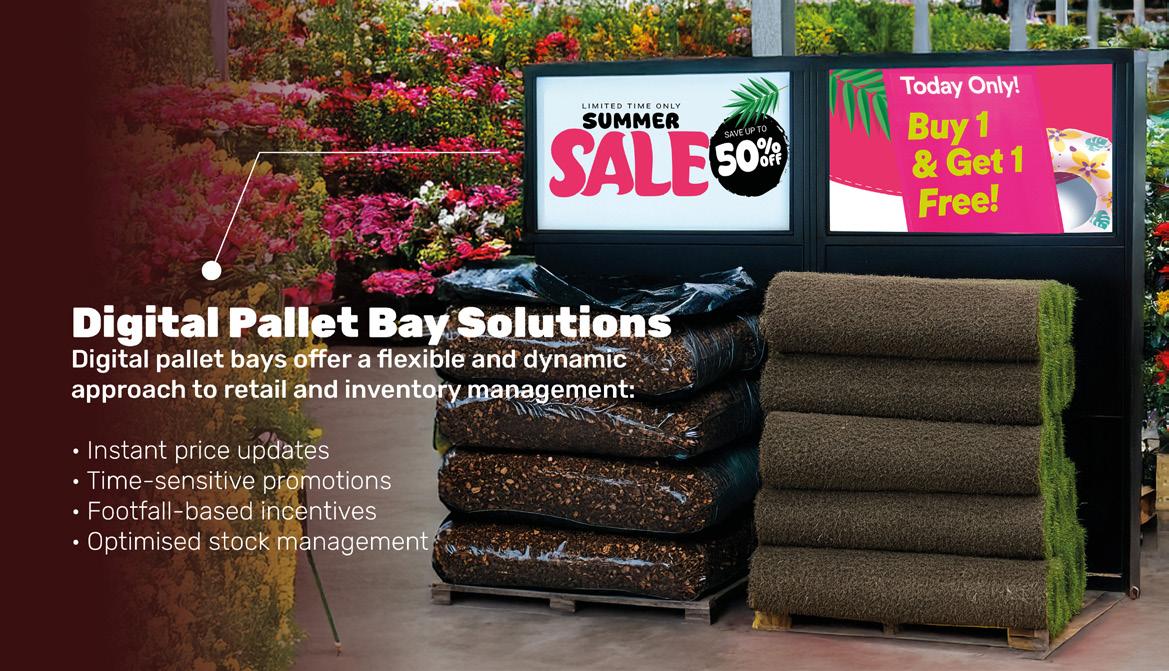
Garden centres have evolved beyond simply selling plants and gardening tools— they’re becoming immersive destinations where visitors linger, browse, and enjoy a day out. As the retail landscape shifts, forward-thinking businesses that embrace digital-first strategies are leading the way in redefining customer experiences and driving sales.
But imagine if a simple lift-and-learn table could educate and inspire customers about the plants they’re buying. What if dynamic pricing screens updated in real time, ensuring promotions were instantly refreshed without the hassle of printing? Or if subtle scent marketing could gently guide shoppers towards the café, increasing footfall in key areas?
These aren’t ideas for the future—they’re happening now in retail spaces across the UK. And garden centres stand to benefit from this revolution more than ever.
Gone are the days when retail was just about stacking shelves and waiting for customers to browse. Today’s shoppers expect immersive, interactive experiences—ones that engage their senses, inform them, and make their visits truly memorable.
When customers connect with brands in a more engaging way, they build stronger relationships—and that directly impacts the bottom line.
So, what if garden centres embraced these innovations? Instead of shoppers casually passing by plants and garden furniture, imagine if they could interact with them in entirely new ways.
Modern shoppers don’t just want to browse— they want hands-on experiences. Garden centres are perfectly placed to introduce lift-
and-learn tables, allowing customers to pick up a seed packet and instantly view digital content explaining how to grow it.
From watering schedules to climate suitability, this engaging approach ensures customers feel confident about their purchases. They’re not simply buying seeds; they’re investing in something they understand and know how to care for.
The result? Higher conversion rates, happier customers, and more repeat visits.
Traditional price tags and promotional signage come with a major drawback—they need to be printed, placed, and manually updated, costing time and money while often leading to inconsistencies across locations.
Enter digital displays—a game-changing digital solution that allows garden centres
to update pricing and promotions instantly. Whether it’s a flash sale on garden furniture or a seasonal offer on outdoor plants, pricing can now be changed in real time, ensuring store-wide consistency without printing costs. These displays even come in solar-powered versions, eliminating concerns about batteries or power supply.
Ever walked past a bakery and instantly craved fresh bread? That’s scent marketing at work—an often overlooked but highly effective way to influence purchasing decisions.
In a garden centre setting, scent marketing can transform the customer experience. Picture shoppers walking through a plant nursery and catching the rich aroma of freshly brewed coffee—an irresistible cue leading them towards the café. This small but strategic trigger can increase café footfall, boost impulse purchases, and create a more inviting atmosphere.
It’s not just about making spaces smell pleasant—it’s about subtly engaging customers and tapping into emotional psychology to drive sales.
Strategically placed digital signage can turn high-traffic store areas into powerful revenue drivers.
Consider pallet bay displays, which can be used to: Encourage multibuy savings—Showcasing
offers that persuade customers to buy more.
• Highlight seasonal specials—Turning displays into eye-catching features for turf, compost, barks, soils and and many more essentials.
• Trigger dynamic incentives—Running timesensitive promotions that adjust in real time, based on sales trends.
The key advantage? Flexibility—shops can adapt to customer behaviour instantly, ensuring the right promotions appear at the right time to maximise engagement.
• Adjust promotions based on weather conditions, ensuring timely offers like discounted compost during a rainy week.
• Instantly update pricing, eliminating outdated deals and ensuring consistency.
• React to stock levels—promoting overstock items or pausing offers for low-stock products.
Digital signage and experiential retail solutions need to be scalable and easy to implement. Unlike traditional signage, these technologies allow retailers to: Move displays seamlessly across different sections—testing what works best.
Trial new formats before committing— allowing measurable results to shape decisions. Expand digital experiences confidently— rolling out innovations once their success is proven.
This isn’t about overhauling operations overnight—it’s about strategically integrating cutting-edge solutions that enhance customer

experience while keeping business operations running smoothly.
At Skratch, we specialise in experiential retail and digital engagement. That’s why we invite garden centre retailers to visit our showroom in Telford, where they can explore the latest innovations in digital signage, test interactive displays, and see firsthand how sensory-driven marketing shapes consumer behaviour.
We collaborate with global brands, including Microsoft, Google, Asics, Asda, Tesco Mobile, Costa, Chanel, JCDecaux, and Bentley, to transform bold concepts into vibrant marketing campaigns.
Backed by years of expertise in retail, we provide data-driven insights that show what works and what doesn’t.
For example, our recent trial of countertop touchscreen displays resulted in higher engagement and increased interaction, and they were deployed across our client’s retail stores globally.
This is retail innovation in action—when used intelligently, digital technology delivers measurable results that businesses can scale across multiple locations.
Retail has moved beyond simple transactions—it’s about creating memorable shopping experiences.
Garden centres that embrace digital transformation will: Boost customer engagement—turning shoppers into active participants.
• Increase sales conversions—as interactive retail experiences drive revenue.
• Stay ahead of competitors—securing longterm customer loyalty through innovation. In short, the future of garden centres isn’t just green—it’s digital, dynamic, and limitless.
Elevate your business with expert guidance!
Contact Gavin Wright at hello@skratchav.com or visit www.skratchav.com to schedule a visit or discuss your unique business challenges. Let’s create solutions that drive success.


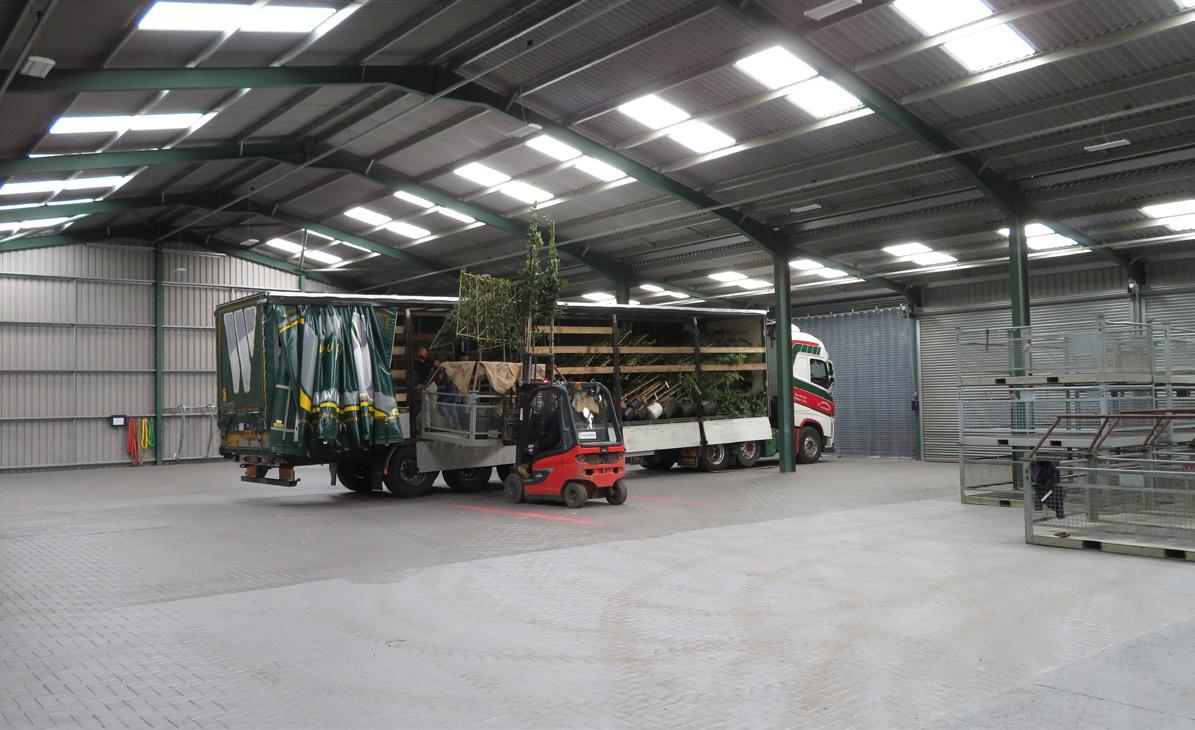
how the garden industry is navigating supply chain
The UK garden industry entered 2025 facing a landscape of supply chain issues. As a sector that relies heavily on the seamless movement of live plants and garden products, some of it imported, the industry has found itself vulnerable to the ripple effects of global economic shifts, evolving trade regulations, and mounting operational costs.
Recent research highlighted that supply chain pressures, and rising costs now top the list of concerns for UK businesses, which include significant disruptions, delayed deliveries and some shortages. These issues are compounded by new international trade tariffs, the ongoing volatility of global politics, all of which add uncertainty for garden retailers, growers, and suppliers.
We spoke to some key stakeholders in the industry about the supply chain challenges confronting the UK garden industry in 2025.
Plants - border bottlenecks and biosecurity
The journey from greenhouse to garden centre has become anything but straightforward, now with stringent plant biosecurity measures and the risk of pests and diseases crossing borders. Brexit, new import regulations, stricter plant health checks and rising costs have all played their part. The UK’s environmental horticulture sector is heavily reliant on imports, with 79% of nurseries and growers dependent on imported plant products, and 99% of these coming from the EU. This makes the industry particularly vulnerable to any friction at the border.
Despite the sector being worth £1.7 billion in 2023, with imports totalling £780 million, the lack of a mutual plant health agreement with the EU has left UK businesses at a disadvantage compared to their continental counterparts.
Last April, the UK government implemented the Border Target Operating Model (BTOM), shifting plant health checks from nurseries and growers to newly designated Border Control Points (BCPs). This move, intended to bolster biosecurity, has instead triggered widespread uncertainty, operational bottlenecks, and spiralling
costs across the sector. The complexity and unpredictability have led some international suppliers to stop trading with UK horticultural businesses altogether, further restricting choice and availability for retailers and gardeners.
The knock-on effect has seen haulage and logistics costs soar, with some businesses reporting increases of over 25%. “I think the biggest threat to the supply chain has been within the haulage coming in from our EU suppliers, due to the delays and headaches around the Border Control Points (BCP), and especially Sevington, Stuart Tickner, nursery production & bio-security manager at Provender Nurseries, tells us.
“A lot of EU hauliers no longer wish to come to the UK, as they spend hours at Sevington, which is adding to their costs, and loss of staff who do not want to come to the UK either.”
The plant inspection delays at the ports have frequently held up deliveries, while the shortage of transport has further complicated matters for Ferndale Garden Centre as managing director, Neil Grant, explains: “The knock-on effect of this is that shoppers may not have the plants on sale quickly enough. Deliveries are at least a day late
and, on many occasions, arrive Saturday morning and late on Fridays. We had to change staff levels to later in the week and late working to make sure houseplants are on display for Saturday morning, which in turn has led to increased wage costs.”
The Danish trolley scheme has also presented challenges, with an excess of trolleys not officially in the scheme and difficulties in returning shelves for repair. “Some nurseries have been ‘ sneaking’ damaged shelves on incoming deliveries but refusing to take damaged shelves back. It’s taking our plant teams longer to make sure everyone gets the ‘correct’ trolleys without leaving us short of registered trolleys, says Neil.
“Increased plant sales this year mean larger volumes of plants, and at times, not enough Danish trolleys and shelves are available for exchange. We have to spread some orders to make it a little easier. We’ve just taken 90 shelves to the depot at Preston, costing us the transport there and back. Some deliveries have been rescheduled for transport.”
The UK garden retail industry, led by the Horticultural Trades Association (HTA), responded to ongoing plant supply chain issues by intensifying its calls for urgent government intervention. The HTA, alongside the Fresh Produce Consortium (FPC) and British Potato Trade Association (BPTA), highlighted those rising costs, such as increased national insurance and wage bills combined with regulatory barriers and inefficient border processes, are threatening the viability of horticultural businesses and the affordability of plants for consumers.
To address these challenges, the HTA has taken a proactive role by presenting the government with solutions that include streamlining border procedures, pausing planned increases in Plant Health Fees, improving communication and data transparency, and enhancing the capacity and efficiency of Border Control Points.
Provender Nurseries has also chosen to become a control point, meaning they brought some of the control back in-house, as they had before the BTOM was introduced. “We have worked hard with our supplier and the hauliers to give them the confidence that we, as a Control Point, do not have the same delays as they do at the BCP,” says Stuart.
HTA has submitted written and oral evidence to parliamentary committees, highlighting the critical reliance of UK nurseries on imported plants. The HTA has also led sector-wide correspondence with Defra Ministers and senior government officials, demanding immediate cross-governmental collaboration and a halt to fee hikes until a full review is conducted.
The industry has also called for a fundamental review of plant health fees and border processes before any increases are introduced, greater transparency in cost calculations, and improvements in service quality from agencies like the Animal and Plant Health Agency (APHA). While supporting long-term ambitions to reset the UK/EU relationship, the HTA stresses that immediate action is needed to resolve current border bottlenecks and supply chain disruptions.
The exceptionally warm and dry spring this year has led to a remarkable surge in demand for garden centre products, with UK garden centres reporting a 22% increase in sales value compared to April 2024. This spike in consumer activity has been a complex balancing act for garden centres, which must ensure timely, high-quality stock deliveries to capitalise on the weather-driven sales boom.
Despite the increased demand, Cowell’s Garden Centre has demonstrated agility and strategic foresight in managing supply chain challenges. “Being independent, we have, a plethora of different suppliers, so our hands aren’t tied,” says Sam Clark. “We do a season reserve which we pull from, and because we use quite a lot of different growers, we have managed to successfully keep a range and haven’t had periods this year where we’ve run out of stock.”
Cowell’s has also been leveraging its strong relationships with local growers and suppliers to ensure steady stock availability. While some faced minor delays overall, they were able to fulfil customer needs without significant stock shortages. “Over the past two years, we’ve adapted to the fact that ordering on a Monday and delivery on a Wednesday from the continent is just not possible. There are still a few of our suppliers where we can pop an order in by 10 o’clock, cut off on a Monday morning, and the delivery will still arrive at us on a Thursday afternoon,” Sam tells us.
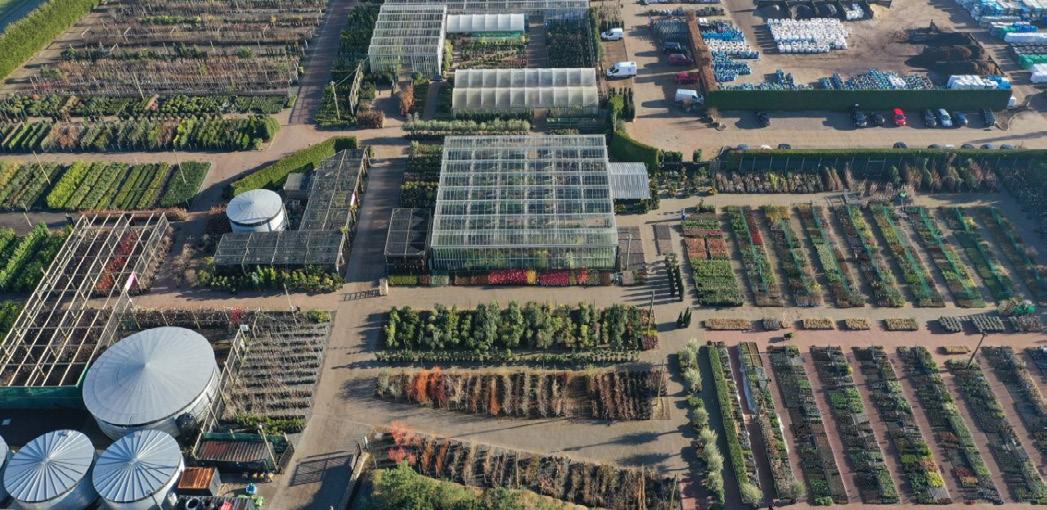
Furniture container delays are still an ongoing issue with the Suez Canal, disrupting global shipping routes. “We can’t reorder easily from China as the delivery time has changed, doubling from six weeks to 12 weeks or so, as they have to travel via South Africa, says Neil at Ferndale.
“This has helped spread cash flow but has been close to being a problem.”
The consistent good weather in 2025 has seen compost have longer lead times, driven by unexpectedly high demand, with early and rapid sales outpacing previous years’ trends. “Who could have predicted such a great early start and for so long? asks Neil. “Compost lead times are a result of demand outstripping supply, with preseason overstocking being a risky strategy given the unpredictability of early sales. This has led to compost sales being lost as customers, once they find a peat-free product they like, are willing to wait or shop elsewhere rather than settle for alternatives.”
The unpredictable UK weather once again reared its ugly head for Taylors Bulbs. Weather can make or break a growing season, and for the team at Taylors, recent years have shown just how much rain and temperature swings can affect everything from planting to harvest.
“The most significant supply chain challenges we faced in the last year are the impact of extreme weather on bulb growing. Planting conditions for tulips back in 2023 were very difficult; those that were planted on time stood underwater, and many of the bulbs were planted very late, said Ian Clark, National accounts manager.
“Too much rain and lack of temperature in the latter stages of growth also hampered yields, which affected quantities and sizes of bulbs for last year’s summer harvest. Growers had to sell smaller bulbs that would usually have been their planting stock to meet orders last year, which has

led to market pressure and price increases for the 2025 season.
“For other bulb crops, the 2024 growing season was varied, the daffodil harvest at Taylors was variable, with the high rainfall having varying impacts from variety to variety.”
Navigating ongoing supply chain challenges and weather has become a top priority for Taylors, a leading supplier to UK garden retailers. “We see it as our job to insulate our customers from supply chain challenges as much as possible, says Ian. “Growing conditions as well as post Brexit impacts have meant Taylors is having to work further ahead, planning requirements of bulbs, packaging and hardware further in advance.
“Many of Taylors’ customers are also well aware of supply chain challenges being faced, and plenty are supportive in planning and booking their requirements well in advance, but there’s

always room for improvement!”
In the past year, some smaller suppliers have faced notable disruptions, particularly due to changes in land use driven by housing pressures. One key challenge, seen by Equigrow, is owners of small equestrian units and stable yards being encouraged to apply for planning permission to convert stables into houses. This shift has directly impacted the availability of essential raw materials. Despite these challenges, Adrian Williams, director at Equigrow, D. Williams and Willen Biogas told us, “We pride ourselves on developing and maintaining good customer relationships, so we’ve worked hard to make sure that our supply chain is sustained and our stockists stay stocked up.
“The reduction in available materials has required significant operational changes, including adapting to new delivery times and procedures, delivering seven days a week rather than the previous Monday to Saturday deliveries we used to run.”
While some brands have struggled with supply and availability, Equigrow has managed to avoid major issues. “We know other brands have had issues with supply and availability, but thankfully, we’ve managed to avoid these and hope our customers have noticed.”
Despite pressures in-house, targets and owners of small equestrian units and stable yards are being encouraged to apply for planning permission to convert stables into houses.
Nonetheless, the company has had to remain flexible, as “We have had to adapt to allow for variances, but also some garden centres are feeling the challenge of the new tax and National Insurance laws,” Adrian continues. “The increased costs of employing staff have resulted in reduced headcounts, meaning fewer people on the ground to help unload vehicles and stock sales areas.”


As the UK’s garden centres continue to flourish, the demand for reliable, fast, and compliant import logistics has never been greater. Whether it’s vibrant bedding plants from Holland, outdoor furniture from Asia, or seasonal stock that needs to arrive just in time for a sunny weekend, the pressure is on to deliver — literally.
That’s where RJJ Freight steps in. With over five years of experience navigating the complex world of postBrexit imports, RJJ Freight is now setting its sights on supporting the garden centre sector. Led by Director Morgan Bagert, the company is ready to bring its proven expertise, flexible service, and personal touch to a new green frontier.
RJJ Freight has built its reputation on handling everything from supermarket flower imports to niche shipments for small-scale farmers. “We work with everyone,” says Morgan. “From someone importing a few trays of lily plants once a year, landscape architects importing large volumes, to major retailers moving cut flowers every week. We’re adaptable, and that’s our strength.”
Now, Morgan sees a clear opportunity to support garden centres — a sector that shares many of the same challenges as his current clients: time-sensitive deliveries, fragile goods, and ever-changing import regulations.
One of the biggest hurdles for garden centres
importing plants and horticultural goods is compliance with UK import regulations.
Since Brexit, the process has become more complex, with systems like IPAFFS (Import of Products, Animals, Food and Feed System) now mandatory for many plant imports.
“IPAFFS is essentially the UK government’s way of tracking incoming shipments,” Morgan explains. “We submit all the necessary documents — invoices, phytosanitary certificates, shipping details — so that the authorities can decide whether to inspect the goods or let them through.”
RJJ Freight handles this entire process on behalf of its clients, ensuring that shipments are cleared before they even arrive in the UK. “If there’s a hold, we jump on it straight away,” Morgan says. “But most of the time, we’ve done everything right the first time, so it just sails through.”
The logistics chain can be daunting — especially when dealing with perishable or delicate goods. RJJ Freight simplifies the process by acting as a single point of contact from start to finish.
“Your supplier can arrange transport, or we can do it for you,” Morgan explains. “We have agents around the world who handle export clearance, and we take care of the import side here in the UK. Once it’s cleared, we can deliver straight to your site.”
And for garden centres that need to react quickly to weather-driven demand? RJJ Freight is ready. “If you order on a Tuesday, we can often get it to you by Friday or Saturday,” Morgan says. “We understand that when the sun comes out, you need stock fast.”
Since Brexit, RJJ Freight has processed thousands of IPAFFS applications and built strong working relationships with the UK’s Animal and Plant Health Agency (APHA). That experience translates into smoother shipments and fewer delays.
“When you’ve worked with APHA as much as we have, there’s a level of trust,” Morgan says. “They know we’re not cutting corners. We do things properly, and that makes a big difference.”
Sustainability is a growing concern for garden centres and their customers — and RJJ Freight
is taking steps to reduce its environmental impact. The company recently installed solar panels at its offices and is exploring other ecofriendly initiatives.
“We’re always open to new ideas,” Morgan says. “If a customer wants us to calculate the carbon footprint of their shipments, we’re happy to assist with hat. It’s something we expect to see more demand for.”
While RJJ Freight is based in the UK, its reach is global. The company can import goods into any UK port and offers air freight options for urgent shipments.
“If you need something fast, we can do air freight,” Morgan says. “It’s more expensive, but if you’re in a pinch, we can make it happen.”
And it’s not just plants. RJJ Freight also handles outdoor furniture, garden tools, and other seasonal stock — making it a one-stop shop for garden centres looking to streamline their supply chain.
• Expertise in plant imports: From phytosanitary certificates to CITES to customs clearance, RJJ knows the process inside out.
• Flexible and responsive: Whether you’re a small independent or a large chain, RJJ adapts to your needs.
Fast turnaround: React to weather-driven demand with deliveries in as little as
48–72 hours.
• Sustainability-minded: Solar-powered offices and a willingness to support carbon tracking.
• Personal service: Speak directly with experienced staff who care about your business.
For garden centres looking to simplify their import process, reduce delays, and work with a logistics partner who truly understands the horticultural sector, RJJ Freight is ready to help.
“We’re not just a freight company,” Morgan says. “We’re a partner. We want to grow with our customers — and we think garden centres are a perfect fit.”
To learn more or get a quote, visit www.rjjfreight.co.uk or contact the team directly.
















In an era where data drives decisions, one type of information is quietly reshaping how garden centres understand their customers and grow their businesses: geospatial data. It’s not just about maps and postcodes — it’s about unlocking the “where” behind the “why” of customer behaviour.
To unpack this emerging trend, we sat down with Chris Duley, founder of data analytics consultancy Adept Insight, who’s been working closely with garden centres and retail concession brands to help them harness the power of locationbased intelligence.
What Is Geospatial Data?













Adept Insight’s Chris Duley on why location intelligence is the next big thing for garden centres
“Geospatial data basically describes things you know based on their location,” explains Duley. “Much of our life is carried out in a spatial context. So clearly, that provides valuable insight.”
In simple terms, geospatial data links information to a physical location — whether that’s a postcode, a neighbourhood, or a drivetime radius. For garden centres, this means understanding not just who your customers are, but where they’re coming from, how far they’re willing to travel, and what that says about your offer.
“If a customer visits a garden centre, there’s
a cost and a benefit,” Duley says. “The cost is the time and effort to travel. The benefit is the proposition at the destination — the quality of the retail offer, the food and beverage, the experience. That’s all geospatially referenced.”
The Garden Centre as a destination
The idea of the garden centre as a destination — not just a shop — is central to how geospatial data is being used.
“There’s a lot of talk about garden centres as destinations, and that’s what a lot of them are striving to be,” says Duley. “That means they’ve got greater pulling power in their catchment. And again, that’s all spatial.”



By analysing how far customers are willing to travel, and how frequently, retailers can measure the strength of their offer. A compelling café, a standout Christmas display, or a premium outdoor furniture range can all extend the reach of a centre’s catchment area.
One of the first steps in any geospatial analysis is defining your catchment area — the geographic zone from which your customers are drawn.
“The first one is understanding your catchment,” says Duley. “What is the size of your catchment? What is the profile of your catchment?”
Even basic customer data — like postcodes from a loyalty scheme or mailing list — can be linked to demographic datasets to build a detailed picture of who your customers are and where they live.
“You can say, OK, 80% of my customers (and their associated spend) are coming from this area”
Duley explains. “You can group that up to postal sectors — there are about 12,000 in the UK — and get population data, socioeconomic characteristics of the population, and build up a catchment profile, often called a Geodemographic Profile”
This information becomes the foundation for smarter marketing: targeted leaflet drops, local advertising, and tailored promotions.
Many garden centres already have loyalty schemes in place — but few are using them to their full potential.
“There’s powerful data in those loyalty schemes,” says Duley. “If you’ve got the customer postcode, you can start looking at where your customers are coming from, as well as how often they visit, what departments they use. There’s a wealth of data which becomes more powerful when linked with geo data.”
For example, a customer who spends £1,500 on outdoor furniture might be willing to travel further than someone popping in for compost. Understanding these patterns helps tailor the offer and the messaging.
“Our analysis suggests that garden centres are heavily reliant on a small group of very frequent visitors,” Duley notes. “It’s all about retaining those customers and rewarding them for their loyalty.”
Adept Insight has worked with both individual garden centres and retail concession brands to build customer segmentation models — grouping customers by behaviour (visits and spend), demographics, and location.
“For one of our customers, we built a customer segmentation using the loyalty data in their retail management system”
says Duley. “We created pen portraits of what their customers look like across different segments — which ones are older, which have higher home ownership, which are more affluent.”
This allows for more nuanced marketing. Frequent visitors might get exclusive offers or early access to events. Infrequent visitors nudged with reminders or incentives to return.
“You need to target those groups in different ways and message them in different ways,” Duley explains.
“And segmenting your customers is how you’re able to do that.”
What about smaller, independent garden centres that don’t have in-house analysts or big budgets?
“They’re often capturing the same sort of data,” says Duley.
“We recognise that those smaller garden centres are not going to want to invest in software that requires users and licences. So, we offer more of a bureau service.”
This means Adept Insight can handle the heavy lifting — analysing the data (the data science), building the catchment models, and delivering actionable insights — without requiring the centre to invest in complex tools.
“They can then understand what their catchment area is and use that as the high-level framework for marketing and communications,” Duley adds.
From Consultation to Action
So, what does the process look like from start to finish?
“These things can be done reasonably
quickly,” says Duley. “We’re talking probably weeks rather than months — and that’s lapsed time, not weeks of work.”
The first step is a conversation: understanding what data the centre already has, what questions they want to answer, and what decisions they’re facing.
“You don’t want to invest in a garden centre that appears to have the weakest catchment, or has a poor fit with your customer profile” Duley warns. “You still need that sort of due diligence to make those decisions.”
As the industry evolves, Duley sees geospatial data playing an even bigger role.
“The successful garden centres are going to continue investing, broadening their offer, ensuring they are a destination that people want to visit at all times of the year,” he says. “They will invest in understanding their customers, targeting their customers and building loyal and lasting customer relationships”
Too often, loyalty schemes are passive — a cost rather than an asset. But with the right analysis, they can become powerful tools for growth.
“There is an opportunity, with maybe a little bit more investment, to get a return on the money they’re spending on those loyalty schemes,” Duley says. “The successful ones will use data insight to build bespoke customer relationships and evolve their offer to different demographic groups.”
In the end, geospatial data isn’t just about maps or marketing — it’s about making better decisions.
“It’s imperative to be utilising the customer data you’ve got,” says Duley. “Particularly that loyalty data. I’d certainly encourage any garden centre that doesn’t have any customer data to try and do something — even if it’s just competitions or mailshots and start capturing some customer data.”
Whether you’re a single-site centre or a national brand, understanding where your customers come from, who they are — and what that means for you — can be the key to unlocking growth.
As Duley puts it: “Geospatial data provides a wealth of information that can drive business success. It’s a powerful tool, especially when linked to customer data, that every garden retailer should consider.”
About Chris Duley
Dr Chris Duley is Founder of Adept Insight Ltd, a geospatial insights company.
Chris has over 25 years of experience providing data-driven analytics helping retailers, across a range of sectors, to make better location planning decisions and to deliver actionable market and customer insight for improved business performance.

Adept website: adeptinsight.co.uk




























Herbs are a powerhouse category for garden centres— compact, versatile, and increasingly in demand. Whether customers are seasoned gardeners, culinary enthusiasts, or eco-conscious consumers, herbs offer a low-barrier entry into gardening with high perceived value. For garden centre owners and plant area managers, herbs represent a commercially viable product that aligns with current consumer trends: sustainability, wellness, and homegrown food.
Despite a challenging start to 2024 due to poor weather and economic pressures, the UK garden centre market showed resilience, with annual sales rising by 3.26%. While outdoor plant sales dipped slightly mid-year, categories like houseplants and food-related products—including herbs—remained strong performers. Herbs, often sold in both edible and ornamental formats, benefit from their dual appeal: they’re practical and beautiful.
The profitability of herbs lies in their fast turnover, low maintenance, and year-round
appeal. Many herbs can be grown and sold in small pots, making them ideal for impulse purchases. They also lend themselves well to themed displays— think “kitchen garden”, “cocktail herbs”, or “pollinator-friendly plants”—which can boost basket size and customer engagement. Herbs are a gateway to repeat business. Customers who start with a pot of basil often return for thyme, mint, or rosemary. With the right merchandise and care advice, garden centres can turn herb buyers into loyal, long-term customers.
As consumer interest in home cooking, natural remedies, and sustainable living continues to grow, herbs are perfectly positioned to thrive. In the following sections, we’ll explore seven of the best-selling and most reliable herbs for UK garden centres, including their growth habits, preferred conditions, and commercial potential.
Garden Centre Retail has picked out the most popular herbs to sell.

Basil (Ocimum basilicum) is one of the most popular and rewarding herbs to grow and sell. A tender annual in the UK, basil thrives in warm, sunny conditions and is best grown in pots, containers, or sheltered beds. It has a bushy, upright growth habit and produces lush, aromatic leaves that range from bright green to deep purple, depending on the variety. Basil is fast-growing and can be harvested multiple times throughout the season, making it a great value plant for customers and a high-turnover item for garden centres.
Basil prefers well-drained soil and benefits from regular watering and pinching out of flower buds to encourage leaf production. It’s ideal for windowsills, patios, and greenhouses, and can be grown indoors year-round with sufficient light. Because it’s frost-sensitive, it
should only be planted outdoors after the last frost.
The benefits of basil go beyond its ease of growth. It’s a staple in many cuisines, especially Italian and Southeast Asian and is used fresh in salads, sauces, pestos, and as a garnish. Its strong scent also helps deter pests like aphids and whitefly, making it a useful companion plant.
Basil is a great herb to recommend to beginners and food lovers alike. It’s visually appealing, fragrant, and practical. Encourage customers to buy multiple varieties such as sweet basil, Thai basil, or purple basil for different flavours and colours.

Mint (Mentha spp.) is a must-have herb for any garden centre, thanks to its vigorous growth, refreshing scent, and wide range of uses. It’s a hardy perennial that spreads rapidly via underground runners, making it incredibly easy to grow—but also important to contain. For this reason, mint is best sold in pots or containers, which also makes it ideal for patios, balconies, and kitchen windowsills.
Mint prefers moist, fertile soil and thrives
in partial shade to full sun. It’s very forgiving and can tolerate a range of conditions, making it a great choice for beginner gardeners. Once established, it requires minimal care—just regular watering and occasional trimming to keep it bushy and prevent flowering, which can reduce leaf flavour.
There are many varieties of mint, including spearmint, peppermint, apple mint, and chocolate mint, each with its own unique aroma and taste. This makes mint a great candidate for themed displays or multi-buy promotions. It’s incredibly versatile in the kitchen—used in teas, cocktails like mojitos, sauces, salads, and desserts. It’s also valued for its digestive and soothing properties, making it popular with health-conscious customers.
Mint is an easy upsell. Recommend it to customers looking for low-maintenance greenery, natural pest deterrents, or edible plants for children. Just remind them to keep it in a pot unless they want it to take over their garden! With its fresh scent and fast growth, mint is a customer favourite that practically sells itself.
Rosemary (Salvia rosmarinus) is a hardy, evergreen shrub that brings structure, scent, and culinary value to any garden. With its upright, woody stems and needle-like leaves, rosemary is both ornamental and practical. It thrives in full sun and well-drained soil, making it perfect for borders, herb gardens, or large containers. Once established, it’s drought-tolerant and low-maintenance—ideal for busy gardeners or those in drier regions.
This Mediterranean native is best planted in spring and benefits from occasional pruning to maintain shape and encourage bushier growth. It’s slow-growing compared to softer herbs, but its longevity and resilience make it a great long-term addition to any garden.
Rosemary is prized in the kitchen for its strong, pine-like flavour, perfect for roasting meats, potatoes, and vegetables. It’s also used in oils, breads, and herbal teas. Beyond cooking, rosemary is known for its aromatic and medicinal properties—often used to improve memory, relieve stress, and repel insects.

Rosemary is a great recommendation for customers looking for a tough, attractive herb that lasts year-round. It’s especially popular in spring and summer but sells well throughout the year due to its evergreen nature. Encourage customers to try different varieties like ‘Prostratus’ (trailing) or ‘Miss Jessopp’s Upright’ for varied garden uses.


an annual. It forms a neat clump of bright green leaves and grows well in pots, containers, or garden beds. It prefers moist, fertile soil and partial shade to full sun. Regular watering and harvesting will keep it productive and lush.
Thyme (Thymus vulgaris) is a compact, aromatic herb that’s as beautiful as it is useful. A hardy, low-growing perennial, thyme forms dense mats or small mounds, depending on the variety. It’s perfect for rockeries, borders, containers, or even between paving stones. With tiny, fragrant leaves and delicate pink or purple flowers in summer, thyme is also a magnet for bees and other pollinators.
Thyme thrives in full sun and well-drained, even poor soil. It’s drought-tolerant and requires very little maintenance—just a light trim after flowering to keep it tidy. It’s ideal for customers looking for a low-effort, high-reward plant.
In the kitchen, thyme is a staple herb used in soups, stews, roasts, and marinades. Its earthy, slightly minty flavour pairs well with meats, vegetables, and Mediterranean dishes. It also has antiseptic and soothing properties, making it a favourite in herbal remedies and teas.
Thyme is a great herb to recommend for small spaces, wildlife gardens, or edible landscaping. It’s also a good companion plant, helping to deter pests. Offer a range of varieties like lemon thyme or creeping thyme to appeal to different tastes and garden styles. Its versatility and resilience make it a reliable seller year-round.
This herb is packed with vitamins and minerals, making it a favourite for healthconscious customers. It’s used in a wide range of dishes—from salads and sauces to soups and stews—and is a key ingredient in tabbouleh, chimichurri, and gremolata.
Parsley is a great herb to recommend to beginners. It’s quick to grow from seed or plug plants and responds well to regular picking. It also makes a great companion plant, attracting beneficial insects and improving soil health.
Parsley is a high-turnover item, especially in spring and early summer. Encourage customers to grow both types for culinary variety. It’s also a great herb for children to grow, thanks to its fast results and soft texture.
and other pests.
Chives are a reliable seller throughout the growing season. Offer them in small pots for impulse buys or as part of a mixed herb display. Their ornamental value and culinary versatility make them a favourite with a wide range of customers.

Chives (Allium schoenoprasum) are a cheerful, easy-to-grow herb that adds flavour and colour to any garden or kitchen. A hardy perennial, chives form neat clumps of slender, hollow green leaves and produce attractive purple pom-pom flowers in late spring and early summer. These flowers are edible and also attract bees and other pollinators.

Coriander (Coriandrum sativum) is a fast-growing annual herb that’s popular in a wide range of global cuisines. It has delicate, feathery leaves and a fresh, citrussy flavour that’s especially common in Indian, Middle Eastern, and Latin American dishes. Both the leaves (known as cilantro) and the seeds are edible, offering two harvests from one plant.
Coriander prefers cool, moist conditions and grows best in spring and autumn in the UK. It dislikes hot weather, which can cause it to bolt (go to seed) quickly. It grows well in pots or garden beds with fertile, well-drained soil and benefits from regular watering and partial shade in warmer months.
This herb is ideal for customers who enjoy cooking and want to grow their own fresh ingredients. It’s commonly used in curries, salsas, salads, and chutneys. The seeds can be harvested and used whole or ground as a spice.

Chives thrive in full sun and moist, welldrained soil. They’re perfect for pots, borders, or herb gardens and can be grown indoors on a sunny windowsill. Once established, they require little care—just regular watering and occasional division every few years to keep them vigorous.
Parsley (Petroselinum crispum/ neapolitanum) is a fresh, vibrant herb that’s easy to grow and incredibly popular with home cooks. It comes in two main types: curly-leaf parsley (P. crispum), which is decorative and often used as a garnish, and flat-leaf or Italian parsley (P. neapolitanum), which has a stronger flavour and is preferred for cooking.
Parsley is a biennial but is usually grown as
In the kitchen, chives offer a mild onion flavour that’s perfect for salads, soups, omelettes, and baked potatoes. They’re best used fresh and can be snipped with scissors as needed. The flowers can also be used to garnish dishes or infused in vinegar.
Chives are a great herb to recommend to families and new gardeners. They’re low-maintenance, visually appealing, and productive. They also make excellent companion plants, helping to deter aphids
Coriander is a great herb to recommend for quick results—it germinates and grows rapidly, making it satisfying for beginners. However, it’s important to advise customers to sow little and often for a continuous supply, as it doesn’t last long once mature.
Coriander is a strong seasonal seller, especially in spring. It pairs well in displays with other fast-growing herbs like parsley and basil. Offering both leaf and seed varieties can help cater to different culinary preferences.

Hayman’s London Dry Gin is crisp, complex and very refreshing. A timeless classic, try it with tonic –and in any number of gin cocktails – and let its flavours unfold.
Hayman’s is the last family of original gin distillers and is proud to put The Original Gin recipe in every bottle. The business still makes all its gin by hand, using only the finest botanicals and a traditional two-day process.
RRP: £29.50 (70cl) haymansgin.com

This Eggcellent Mini Egg Cookie Mix from Bottled Baking Co has all the dry ingredients required to make Mini Egg filled cookies. Whether it’s been bought as an Easter gift, as a rainy-day activity with the little ones, or just as a personal treat, with the addition of just a few extra cupboard staples, this Eggcellent Mini Egg Cookie Mix promises 22 of the tastiest cookies.
RRP: £10.99 bottledbaking.co.uk

Stokes Cheeseboard Collection
Stokes Sauces Ltd
Stokes Cheeseboard Collection is the perfect gift for anyone partial to a little cheese and wine. It contains four of Stokes most popular relishes and chutneys: Fig Relish brims with dried figs for a sweet accompaniment, yet wonderfully tart finish; Chilli Jam is sticky, sweet with gentle chilli notes; Red Onion Marmalade is a full flavoured reduction with black treacle and balsamic; and Sticky Pickle rounds the cheeseboard up superbly.
RRP: £18 stokessauces.co.uk

The Naked Marshmallow Co
The original and bestselling marshmallow toasting gift set, perfect for those with a sweet tooth and for any marshmallow fans out there. Customers can experience the fun of toasting gourmet marshmallows at home with their very own marshmallow toasting gift set, which can be used both indoors and outdoors and includes everything they need to start toasting right away.
RRP: £21 nakedmarshmallow.co.uk

Pizza Lover’s Biscuit & Craft Kit Craft and Crumb
Pizza and biscuits surely are a winning combination so Craft and Crumb has put them together into a wonderful Pizza Biscuit baking kit. Each kit comes beautifully packed up and contains all the dry ingredients and tools needed to create your own pizza slice shaped biscuits and pizza bunting craft too.
RRP: £20 craftandcrumb.com

TTK Confectionery’s signature Treat Kitchen milk bottles, but with a slight baking twist! The twist being that all the ingredients you need to make the chocolate bakes are in these bottles – the perfect food family activity, without the messy clean up. There are three options available: Triple Choc Cookies, Chocolate Brownies or Triple Choc Muffins.
RRP: £5 ttkconfectionerywholesale.co.uk



British garden equipment manufacturer Handy has announced a raft of promotional offers across a substantial range of garden machinery ideally suited to Autumn tasks. Retailers can benefit from pricing reductions on SSP for hedgetrimmers, chainsaws, log splitters, leave blowers, shredders and more.
Long days and warm weather can take its its toll on gardens during the Summer months, so Autumn is a busy time of year as gardeners across the nation step up and start to prepare for the dominant Winter months ahead. Having the right Autumn gardening machinery in stock is essential to meet customer needs and provide valuable sales opportunities.



With the arrival of Autumn comes the bane of the season for many gardeners, clearing fallen leaves. To make light work of this task, garden blowers/ vacuums are an essential piece essential pieces of garden equipment. Handy has special offers on blowers and combined Vacuum/Blowers that also shred debris into a compostable mulch, across its Greenworks cordless, The Handy and Q Garden electric, and Webb petrol models. There is a wide range to choose from to suit all budgets.
Autumn is also the time of year you’re most likely to hear chainsaws in the garden, as trees and light shrubs get pruned to help keep them healthy and in good shape for the months ahead. To make light work of this challenging job, Handy has a comprehensive range of chainsaws and logs splitters available.




When it comes to getting rid of all those leaves and branches after pruning back those trees and shrubs, a garden shredder is ideal. Three shredders included in Handy’s Autumn offers is including the Webb Electric Impact Shredder with Box and Detachable Hopper.








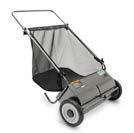



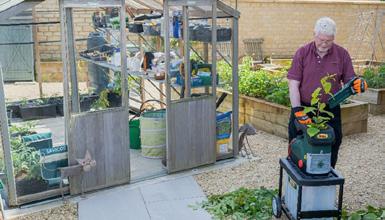



Over 70 garden machinery products have been included in Handy’s new Autumn garden machinery promotion, which is available on orders placed before the end of September 2025.
For more information, visit www.handys.co.uk or email sales@handys.co.uk
